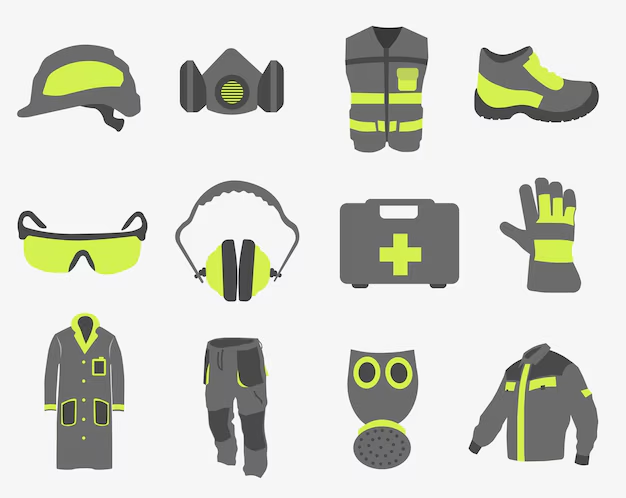When cleaning, especially with harsh chemicals or in environments with dust and bacteria, wearing the right protective gear is crucial. Protective equipment not only keeps you safe from chemical exposure, allergens, and germs but also enhances efficiency by preventing accidents and skin irritation.
1. Why is Protective Gear Important?
✔ Prevents Chemical Exposure – Harsh cleaners like bleach and ammonia can irritate the skin, eyes, and respiratory system.
✔ Reduces the Risk of Inhalation – Dust, mold spores, and strong fumes can cause breathing difficulties.
✔ Protects Skin from Irritation – Prolonged contact with detergents or disinfectants may lead to dryness or rashes.
✔ Minimizes Cross-Contamination – Proper gear helps keep bacteria and germs contained, reducing the spread of illness.
2. Essential Protective Gear for Cleaning
a. Gloves 🧤
Gloves are the first line of defense against harsh chemicals, bacteria, and dirt. Different types of gloves serve various cleaning purposes:
🔹 Disposable Gloves – Made from latex, nitrile, or vinyl. Best for single-use tasks like disinfecting surfaces or handling waste.
🔹 Reusable Rubber Gloves – Thick and durable, perfect for heavy-duty cleaning like scrubbing bathrooms or washing dishes.
🔹 Chemical-Resistant Gloves – Offer extra protection when handling strong cleaners like bleach or ammonia.
✔ Tip: Choose nitrile gloves if you’re allergic to latex!
b. Face Masks and Respirators 😷
Masks help protect against dust, fumes, and airborne bacteria. They are especially useful when using strong cleaning agents or working in poorly ventilated spaces.
🔹 Disposable Face Masks – Basic protection against dust and mild chemical fumes.
🔹 N95 or KN95 Respirators – Offer better filtration and protect against fine particles and airborne pathogens.
🔹 Full-Face Respirators – Needed for extreme chemical exposure or mold removal.
✔ Tip: Always use a mask when cleaning with bleach, ammonia, or mold removers to avoid inhaling toxic fumes.
c. Safety Goggles or Glasses 🥽
Your eyes are highly sensitive to cleaning chemicals and dust. Safety goggles prevent:
✔ Splashing of bleach, ammonia, and disinfectants.
✔ Eye irritation from strong fumes.
✔ Dust particles from entering the eyes.
🔹 Anti-Fog Safety Goggles – Best for long cleaning sessions.
🔹 Chemical Splash Goggles – Fully sealed for heavy-duty cleaning.
🔹 Basic Safety Glasses – Provide minimal protection against dust and small particles.
✔ Tip: If chemicals get in your eyes, rinse immediately with cool running water for 15 minutes and seek medical attention if irritation persists.
d. Aprons and Protective Clothing 👕
Wearing the right clothing prevents spills and stains on your everyday clothes.
🔹 Waterproof Aprons – Protect against splashes from cleaning solutions.
🔹 Long-Sleeved Shirts & Pants – Provide extra coverage when deep cleaning.
🔹 Disposable Coveralls – Ideal for handling hazardous materials like mold or heavy-duty disinfecting.
✔ Tip: Choose washable aprons made from waterproof or stain-resistant fabric for easy cleaning.
e. Shoe Covers or Slip-Resistant Shoes 👟
Proper footwear helps prevent slips and falls, especially when cleaning wet floors.
🔹 Shoe Covers – Disposable or washable covers keep shoes free from dirt and chemicals.
🔹 Slip-Resistant Shoes – Essential for professional cleaners to avoid falls.
🔹 Rubber Boots – Protect feet from harsh cleaning agents and wet conditions.
✔ Tip: Always wipe up spills immediately to prevent accidents.
f. Hearing Protection (Earplugs or Earmuffs) 🎧
Loud cleaning equipment like vacuum cleaners, pressure washers, or industrial scrubbers can be harmful to hearing over time.
🔹 Foam Earplugs – Inexpensive and disposable.
🔹 Noise-Canceling Earmuffs – Ideal for prolonged exposure to loud equipment.
✔ Tip: If you’re using loud cleaning machinery frequently, invest in good hearing protection to avoid long-term hearing damage.
3. Best Practices for Using Protective Gear
✅ Always wear gloves when handling chemicals or dirty surfaces.
✅ Wash or disinfect reusable gloves after each use.
✅ Ensure proper ventilation when working with strong chemicals.
✅ Store protective gear in a clean, dry place for future use.
✅ Replace disposable masks and gloves after each use to prevent contamination.
4. Conclusion
Protective gear is essential for safe and effective cleaning. Whether you’re doing light household cleaning or deep sanitization, the right equipment prevents exposure to chemicals, germs, and potential hazards. Investing in quality protective gear ensures your safety and comfort while making cleaning tasks more efficient.

